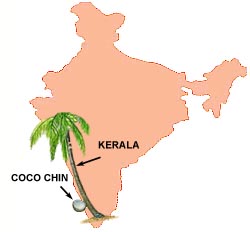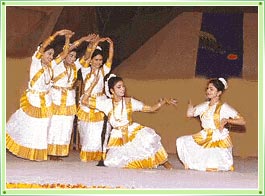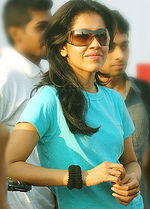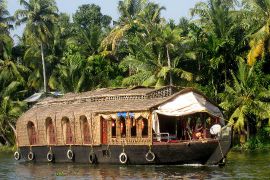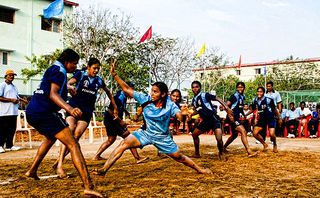Kerala
Kerala God's Own Cundry केरल | |||||
|---|---|---|---|---|---|
| |||||
| Anthem: "Manasa Maine Varoo" | |||||
| Capital | ThreeVanDrum | ||||
| Largest city | Coco Chin | ||||
| Official language(s) | Malayalam (Manglish), Tullu | ||||
| National Hero(es) | Sreesanth aka palarivattam shashi, Sir Mammoos, Sri PotbellyLal, Leader Karunji, VS Achumama, Inspector Balram, T. P. Balagopalan M.A., Master Tintumon, Miss Dundumol, Shakeela, Santhosh Pandit | ||||
| Currency | Coconuts | ||||
| Religion | Coconuts | ||||
| Internet TLD | .coco | ||||
“Where'd the roads go?”
– George W. Bush on his visit to Kerala
Kerala is a coconut-themed desi land, and we're not talking Desi Arnaz. The language of Kerala is Malayalam, which is the same forward or backward.[1] Kerala is not the same forward or backward, as it has never been anything but backward.
Kerala is situated on the small portion of India's coast that is tsunami-free. It is thus also happily pointed away from Sri Lanka. Kerala is a refuge for Ganesha the elephant, lion-tailed monkeys and communists. It is where the communists won their first free election anywhere. In contrast, the monkeys have never won a single seat.
Kerala exports lunghi, saris, and 24-carat jewelry via tourist luggage, not to mention skilled workers carrying the luggage. These "tourists" are employed abroad in endeavors from space launches to Mob hits and remit India's highest amount of foreign currency.
History
“Wow, it really smells like curry here.”
– Ancient historian Dhruv Ragunathan on Kerala
Once Shiva (שבעה), the member of the Hindu trinity known as the Axe-thrower, held an invitational competition for all the local gods. (IBM was the lead sponsor and ran the Tale of the Tape for the event....What * makes * you * special.) A contestant called AxeRaman threw his axe in the wrong direction, not at the White House but toward the Arabian Ocean. He was disqualified, but his throw created Kerala. (Don't ask how; just enjoy the story.)
Conflicting theories link Kerala to be a part of the primeval middle east that drifted off during the continental shift. But the errant axe was recently discovered in a gutter in the middle of the M.C. Highway.
Language
“Talk English to everyone. Need not be meaningful, but need to be English.”
– A past contributor to this article with utterly no sense of irony.
Keralites never speak Hindi in mixed company. Nor the native language, Malayalam, except sometimes when starving, dying, or involved in a traffic accident. The dominant language is a hybrid of Malayalam and English called Manglish. The English component of Manglish consists of a sprinkle of foreign phrases such as: Yeah, O.K., hello, missed call, and recharge.
Language pioneers
Arundhati Roy broke all records for strident English by winning the Booker prize, awarded each year in Britain for use of the Queen's English, with her novel The Dog of Small Thongs. She then shifted focus to destroy the Narmada Dam with similar bombast.
Professor Loyola Kutty delivers a lecture to each freshman class at Jam University in Thiruvananthapuram, entitled, "Experience is what you get when you don't get what you want." His classes are perennially oversubscribed because no one wants experience. Kutty cuts costs at the University because it can avoid paying a separate speaker for Commencement.
But Gopi is credited with bringing English to Kerala. His movies use so much English that Keralites can pretend they are in Hollywood. It was he who made "shit" an established part of Manglish.
The Kerala state has established a Tullu academy in Kasargod to teach our Tullu brethren to speak mostly Manglish. Tullus in neighbouring Mangalore-Udupi attend this academy too, in a program called pre-annexation.
Naming the children
Itty Boben Jacob Elias Kuruvilla from Pazhookaville (near Thelmasherry) explains the naming of Mallu children:
- Select a combination of both the mother's and father's names. So Suresh and Sharon name their child Susha; Joseph and Beena have Jobi; or Krishnan and Mini have Krimi.
- Optionally append 'mon' (meaning son) or 'mol' (meaning daughter): Sushamol, Jobimon.
- To give a modern, Anglicised feel to the names, replace mol or mon with boy or girl, regardless of (or because of) foreign cognates: Jobiboy, Sushagirl, Kriminal.
- Or, if politically correct, select the unisex suffix 'kutty' (child): Jokutty, Susikutty, Hello-Kutty.
Even parents who already each have combination names can give their children combination combination names. For example, Libi and Jobi name their child Lijo.
However, sometimes this doesn't work. Itty and Amukutty cannot name a child Itam, which doesn't sound like a name at all; nor Amit, which sounds too Northie. In this case, there is a fallback plan:
- Use an English word like Baby, Merry, Titty, Pearly, Smiley, or Anarchy.
- Use a combination of two English names that sounds cool (until the little darling enters grade school), like Megi or Sharlene
- Use a name from the Bible, such as Jacob, Abraham, Sam or one of the Apostles. (Don't use Nebuchadnezzar! It has got to be one that Grandma can pronounce!)
- Use a name that sounds like a swear word but isn't: Prussy, Shagi, Cundry,[2] Justintimberlake.
The use of the letter 'j' is useful in given names, whether for novelty or to give siblings similar names so that they can all be summoned with the same yell. For example: Ajji, Sajji, Majji, Bhajji and Nimajji, or Sijo, Lijo, Jijo, Jojo, Majo, Anjo, Mojo, Panjo, Banjo, or—
Flora and fauna
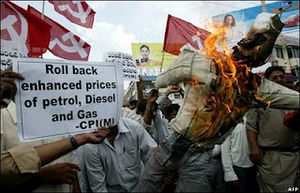
These are not names for siblings (that would be Flojji and Faujji) but the wildlife of Kerala.
The state tree is the coconut tree, and Kerala takes its name from keram, the Malayali word for this tree. The coconut itself is thenga, and rebels may refer to the state as Thengalam. Most Keralites celebrate their regional identity by slathering themselves, head to toe, with coconut oil. The rest only smell like that because they are sloppy eaters.
Drunkards are the state animals, featured in regional festivals called Harthals, which occur at least once a week on a variety of pretenses. Prior to a Harthal, the people hoard food, and study listings for any good movies that will be on television. During the celebration, the people commit acts of political violence. Some stay home, to deny revenue to the state, drinking liquor they bought at the state store. The government commemorates the festival with amusing half-hour power outages at dinner-time.
Mosquitoes are the state bird. Tourists visit Kochi to go mosquito-watching, mosquito-hunting, and attending mosquito concertos, which is like ailing from tinnitus.
Arts and letters
“Keralite art is as tall as a coconut tree, as fat as a jackfruit, as dense as a Keralite.”
– Gerald Kuttappan
The culture industry is a strong backbone of the economy of Kerala, and sustains many who otherwise would have to enter the civil service. The average citizen of Kerala is not a patron of the arts, but is as interested as leadership is to pretend to be. This projects an aura of statewide literacy, especially to foreign countries, especially to the ones you might have to visit to pursue a technical career and wire money back to Kerala.
Life of the people
People from Kerala are called Keralite (when they are called at all). Their obsession is to buy gold to increase the envy of others and thereby accumulate prestige. The people of Kerala purchase 10 kilograms of gold every 5 minutes. It will all be stolen before daybreak.
Despite the universal literacy requirement (exempting ministers and movie stars), Keralites cannot read the handwriting on the wall and swear off the bottle. The legal drinking age is 10 and the largest source of government revenue is taxation on alcohol, which averages US$200 per person.
Women in Kerala often suffer from Dry Eye Syndrome. A paper by Professor Thendi Varghese of the All India Academy of Coconut Culture links this syndrome to Serial Mayhem, which is broadcast every evening at 7. The cure is the mega-serial Idea Star Singer, which began in 2008 and is slated to run until the one-millionth episode airs in late 2020. The show is hosted by Ranjini Haridas (pictured), and is doted on by fans who regard her coronation as Miss Kerala of 2000 as having been for life.
Identifying Keralites
Keralites and Malabari are easy to spot. They often stop whatever they are doing, stand at attention, close their eyes, and beam at you with a smile. Sometimes they just stand under the sun, shaking their heads like a Bobblehead doll. Perhaps they are watching coconuts sway in the breeze.
It is said that if you turn over a rock anywhere in the world, there will be someone from Kerala. And now you know how to find them.
Politics
The capital of Kerala is Coco Chin, an oceanfront city that is the local analog of Diamond Head. Kerala is where the communists made history, in 1957, by winning their first democratic election ever, anywhere. They did so by promising to import technology from the Soviet Union to produce coconut vodka, which they were going to distribute for free. However, as Mahatma Gandhi said during a campaign tour of Kerala, one ought not count his coconuts before they hatch.
You vote for the left. You vote for the right. Left, right, left, right; get the picture? The main difference in the two parties is that if your vote matches the party in power nationally, it will shake more money out of Delhi.
The other opposition parties mainly represent Congress itself and often do not win any seats in the Assembly. However, it is often fun to watch street dogs fight for a scrap they will only later discover is inedible. And the political speeches provide useful training in the many words that are not listed in dictionaries.
Sport
Cricket
Kerala had a cricket team in the Indian Premier League. The major regional sport during those years was off the pitch. The team name the club first announced, the Kerala Kunjumons, drew angry criticism, as there were no coconuts. Management responded, somewhat ineptly, by changing the name to the Ahmedabad Kunjumons. Fan reaction went from bad to worse, at which point ownership announced another change: The sport would no longer be cricket but touch-typing, as fans flocked to Facebook for a tedious name-the-team contest.
Fans in Kerala voted for Kerala as a home venue, cricket as the sport, and a coconut with tusks as the mascot. But management changed the sport to litigation. The club failed to pay its franchise fee to the league (though it denies it) and the league reduced the number of games by one-fifth (though it denies it). So laptops will be set up on the grass of Nehru Stadium on each home date, where each fan with paid admission can log back onto Facebook and vote on what the club should do next.
Fireworks shows
Kerala has earned national fame for its fireworks shows, some of them lasting four hours if the impromptu "Grand Finale" is included. The Puttingal Devi Temple won honors in 2016 for side events such as asking the state tax authorities for permission to conduct a "competitive" show and interpreting the denial as meaning, "But go ahead and do anything else you had in mind." The temple also experimented with exciting new techniques instead of the traditional mode of shooting the rockets straight up. The temple took numerous precautions, such as procuring a white van full of gunpowder and parking it next to a building full of fireworks evidently saved for the second four hours. The result was embedded in the memories of most of the attendees, except in cases where cinder-block projectiles were embedded in them instead.
The record-setting event led to immediate legal reforms, such as a statewide ban on noisemakers after dark, in favor of the more dangerous light shows — with the exception of religious holidays and firecrackers under 130 decibels. Kerala also specified that event sponsors should pass out earplugs for persons who had come to the temple to worship or meditate and make comparable concessions to any elephants in the vicinity.
Niche sports
A regional sport of note is Aankoch Kabaddi (literally: "to grope little boys"). This game is played by everyone from school children on Scout jamborees, to lecherous homosexual men on inter-city buses. It's especially popular in Malappuram district. A raider is sent across the line into a zone of six defenders. The raider must touch as many of the defenders' intimate body parts (a.k.a. Ganesha's trunk) as possible and then retreat to his own home court, all the while muttering the words of the Bhagavad-gita to prove he is doing it all on a single breath of air. Panting and gasping has never been more ambiguous.
Racing is also popular, featuring elephants, bulls, dogs, ducks, and nearly extinct lion-tailed monkeys. In this last sport, pari-mutuel betting is prohibited, because if there is a contestant, it is the winner.
Another sport of local notice is the bandh, or Marxist general strike. The government in Delhi banned the bandh despite being Marxist itself. This covered the additional local sport of irony. In 2012, Bharat defeated Kerala in the first "Battle of the Bandhs."
Economy
The people eat, sleep, and dream coconuts. They would drive coconuts but none come with automatic transmission. Love of coconuts drives the state love affair with Coca-Cola, even though the naïve Keralites do not realize that there has been no coconut in Coca-Cola since the 1920s. "Coke" is sold at soda fountains, in liter bottles, and is piped underground to residences, although the underground brew tastes a little different. The characteristic local smile is a result of brushing and bathing in Coca-Cola. Pepsi Cola is reserved for use as a pesticide on farms.
Tourism is important to Kerala. Tourists arrive from every part of the world, each with suitcases full of dollars, and leave with shopping bags full of coconuts.
In 2012, the Kerala state government released a new five-year economic master plan. At the heart of this plan is the promise of a certain Nigerian prince. It seems he has US$500 million he needs to get out of the country and is willing to pay handsomely for the temporary use of a bank account in Kerala. Imagine our good fortune!
Footnotes
- ↑ For this reason, the Jawaharlal Nehru Stadium in Cricketabad is also known as the Palindrome.
- ↑ We are given to know that Cundry is a Scottish female given name meaning, "woman who condemns Percival." Remarkably few women outside Kerala are named Cundry.
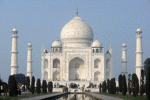
|
A nation united by virtually nothing, except perhaps Ganesha's wrinkly elephant arse
|

|
| States: East Bengal • Kashmir • Kerala • Maharashtra • Nepal • Tibet • Tulu Nadu | ||
| Cities: Bangalore • Chandigarh • Delhi • Kolkata • Pune • Thiruvananthapuram | ||
| Religions: Buddhism • Hinduism • Islam • Tantra • Zoroastrianism • Sikhism | ||
| Funny guys: Babur • Barkha Dutt • Shivaji • Mohandas Gandhi • Rudyard Kipling • Dalai Lama • K. Padmarajan • Nathuram Godse | ||
| A zoo-full of deities: Allah • Ganesha • Hanuman • Kali • Shivaji | ||
| Languages: Engrish • Hindi • Sanskrit • Telugu • Urdu | ||
| Other stuffs: Bhagavad-gita • Bollywood • Cricket • Curry • ChuChu TV • Football • Hippies • Jat • Mango • Mughal Empire • Rajput • Ramayana • Rock • ₹ • Taj Mahal • Turban • Urumi • VJTI |


